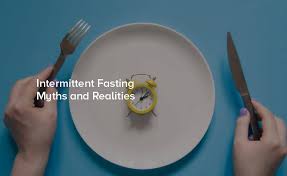Intermittent fasting (IF) has become one of the most talked-about health trends in recent years. Celebrities, influencers, and fitness experts swear by it—but how much of what we hear is science, and how much is myth?
Let’s break it down.
🧪 What Is Intermittent Fasting?
Intermittent fasting is not about what you eat, but when you eat. It involves cycling between eating and fasting periods. Popular IF methods include:
- 16:8 (Fast for 16 hours, eat within 8)
- 5:2 (Eat normally for 5 days, restrict calories for 2)
- OMAD (One Meal A Day)
✅ The Science: What We Know
Here’s what research supports:
1. Improved Insulin Sensitivity
Fasting helps reduce insulin levels, improving blood sugar control—especially helpful for those with pre-diabetes or Type 2 diabetes.
2. Weight Loss
Intermittent fasting reduces calorie intake and boosts fat burning without requiring extreme diets.
3. Cellular Repair & Longevity
During fasting, your body initiates autophagy, a process that removes damaged cells and supports anti-aging.
4. Mental Clarity
Many people report enhanced focus and brain function, possibly due to stable energy levels and hormone regulation.
❌ The Myths: What’s Not True
Let’s debunk some common misconceptions:
❌ Myth 1: “You’ll Lose Muscle”
FACT: With proper protein intake and resistance training, fasting doesn’t cause muscle loss. In fact, growth hormone increases during fasting.
❌ Myth 2: “You Must Skip Breakfast”
FACT: IF doesn’t require skipping breakfast. It’s about the timing window, not a specific meal.
❌ Myth 3: “Fasting Slows Your Metabolism”
FACT: Short-term fasting actually boosts metabolism slightly. Long-term starvation is what slows it down.
❌ Myth 4: “It’s for Everyone”
FACT: IF is not ideal for pregnant women, people with eating disorders, or those with specific medical conditions. Always consult a doctor.
⚠️ Side Effects and Risks
- Headaches or fatigue in the first few days
- Overeating during eating windows
- Nutrient deficiencies if not planned properly
🔄 How to Start Safely
- Begin with 12:12 or 14:10 (easier than 16:8).
- Stay hydrated—water, herbal tea, black coffee allowed.
- Focus on whole foods during your eating window.
- Avoid binge eating or junk food.
🧘 Final Thoughts
Intermittent fasting is a powerful lifestyle tool, not a quick fix. While backed by solid science, it’s not a one-size-fits-all approach. Success comes from consistency, balance, and listening to your body.
Science supports it, myths distort it—so fast smart, not blindly.
































































